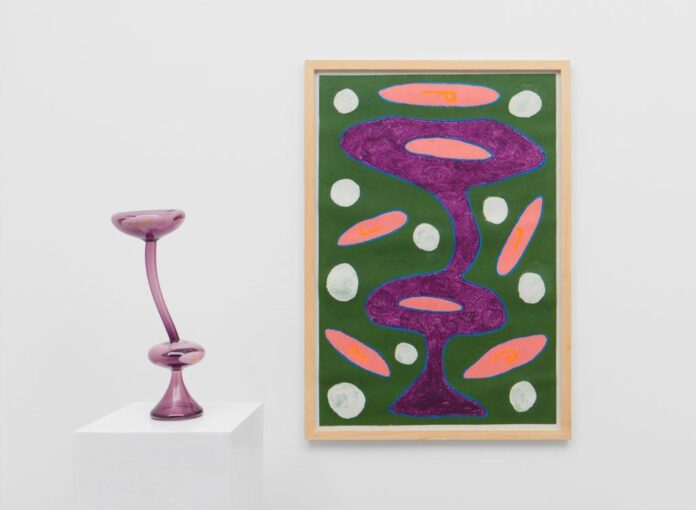Despite the line out the door to Tribeca’s Spring Studios yesterday, there was a murmur that Independent New York isn’t quite what it used to be. The chatter was that the invite-only alternative to New York’s mega art spectacles of Frieze and The Armory Show has lost its luster, having given some of its edge over to designers and consultants. Visitor comparisons to the Independent’s pre-pandemic status abounded.
There might be something to those charges. The crowd was more low-maintenance than haute-couture, though Valentino’s viva magenta was flashing on all sides, and on the roof the wares of jewelry designers faced off against pastries sweating in the May morning heat. Spring Studios remains a discombobulating maze, where wrong turns lead to sudden lounges and endless white hallways.
But change is inevitable for a fair now in its 14th edition. Among the 66 galleries and nonprofit organizations hand-picked by the fair, there are indeed some gems. New this year is Independent Editions (not the NFT kind) that sees the likes of the Paris Review, Cal Arts, and Texte Zur Kunst offering retro prints.
In the lead up to the fair, which runs from May 11 to 14, co-founder Elizabeth Dee stressed that it emphasizes “the next generations of rising galleries.” If so, the future is decidedly analog: a set of neon signs, a television—that’s about as high-voltage as Independent gets. In this moment of soaring digital art, there’s hope for painters yet.
Here are five booths that stood out.
The Sunday Painter

Nicolas Pope, (2015). Image courtesy The Sunday Painter.
After contracting viral encephalitis while studying wood sculpting in Tanzania, Nicholas Pope took a prolonged hiatus and then turned to softer materials, namely pastels and glass. marries 14 glassworks, blown at Sunderland’s National Glass Centre, with as many swirling abstract drawings. Some correspond easily, others less so, which makes for a fun guessing game. Despite the severe subject matter, Pope’s works are bright and playful. “They are humorous pieces, he’s not religious,” the gallery’s manager Lisa Modiano tells Artnet, “it’s playing with the idea that one person’s sin is another’s virtue”.
Susan Inglett Gallery & Specific Objects

Kusama (1969). Image courtesy Susan Inglett Gallery.
In the mid-1960s, Yayoi Kusama had a realization: more people read porn magazines than (a fact doubtless still true, though the verb “read” really doesn’t go with the noun “porn” anymore). Her response? To create , her own salacious flick, which she used to spotlight her own “happenings.” One such 1969 happening was a room of soft polka dot sculptures Kusama created for naked photoshoots. She invited people to rent the room, a model, and a camera from her by the half-hour.
This is the starting point for husband and wife duo Susan Inglett and David Platzker’s mini-show “Kiss and Screw: The Sex Review” which presents the responses of three female artists to pornography. Also on view at the booth are original super-phallic t-shirts Lynda Benglis screen-printed to fund her infamous nude cover and alterations Beverly Semmes made to porn magazines gifted to her by a parting neighbor. “Rather than fighting pornography, they each used it to have a conversation,” Inglett said of the artists. “They asked questions, [such as] ‘are [the women] victims in need of our support, or something else?’”
Nina Johnson

Rob Davis (2023). Image courtesy Nina Johnson.
Revanchist contemporary politics have given nostalgia for Americana something of a bad rep. But Rob Davis wants to go back, namely to the working-class Virginia of the 1970s that he grew up in. The tonality of his hyper-realistic paintings seems to scream “California!” and that says a lot about our perception of bygone American aesthetics—namely that they belong only to sun-tinged coastal states. Davis’ paintings focus on a lost analog world: the Beatles and Hendrix LPs we no longer touch, the landline we no longer hope will ring, the house party that won’t be memorialized on social media. “There’s a darkness in the paintings,” Nina Johnson tells Artnet News, “not like a murder in the building, more like the family has left the kitchen table.”
Higher Pictures

D’Angelo Lovell Williams
(2023). Image courtesy Higher Pictures.
D’Angelo Lovell Williams is a photographer striving to reframe black queer bodies and—at the age of 30, with a monograph published by MACK and work in the collections of the Whitney, the Tate Modern, and LACMA—they’re right on track. In the artist’s first solo showing at an art fair, Higher Pictures displays Williams’ characteristic portraits of friends and lovers that veer from the immaculately staged to the seemingly spontaneous. New here is a collection of Williams’ weavings, one of which casts them in childhood in the embrace of their grandmother and stands in solemn juxtaposition with the neighboring photograph of them standing before her open casket.
Richard Saltoun

Eleanor Antin, (1972). Image: courtesy: Richard Saltoun.
Eleanor Antin’s conceptual-art protest to the Vietnam War was to march a set of 100 black rubber boots from suburban California to New York’s MoMA, where she was shown in 1973, posing the empty footwear frequently along the way. She had the boots photographed prosaically lining up for church, the bank, the supermarket, and the bus along the way. She mailed these photographs as postcards to friends, curators, dealers (at $0.6 a stamp), reaching more than 1000 people and institutions. Richard Saltoun presents a framed collection of Antin’s postcards along with a series of ghostly black and white photographs taken in New York. It’s the first time in 50 years, the gallery says, that Antin’s work has gone on display.

























